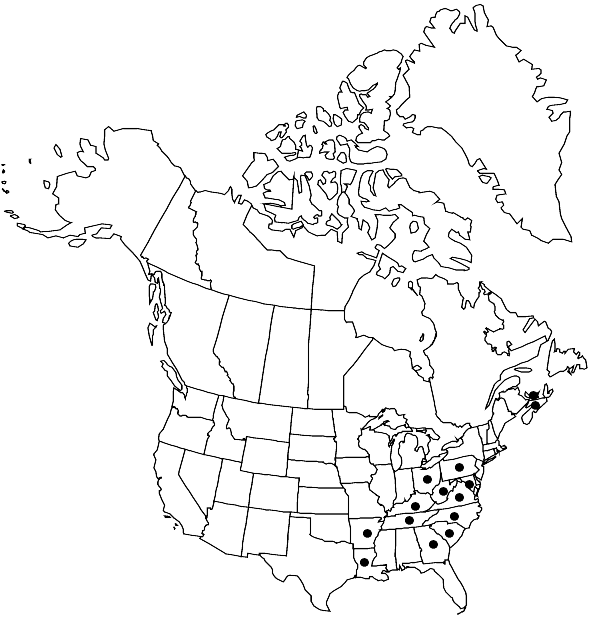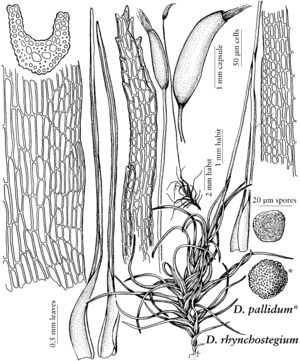Ditrichum rhynchostegium
Rev. Bryol. 37: 14. 1910,.
Plants in low, silky green to yellowish green tufts or loosely gregarious. Stems to 1 cm, simple. Leaves to 5 mm, erect to some-what flexuose and spreading, rather crisped or contorted when dry, linear-subulate from a rather suddenly widened, subsheathing base, subula channelled distally, lamina 2-stratose distally; margins erect, slightly denticulate close to the apex, 2-stratose in the subula; costa broad and flat, occupying ca. 1/4 of the leaf base, percurrent, occupying most of the subula, in section with a prominent abaxial and weak adaxial stereid band; cells of the leaf base rather laxly oblong-hexagonal, wider near the costa, narrower and shorter near the margins, becoming shorter and subquadrate to short-rectangular and thicker-walled in distal sheath, short-rectangular to quadrate in the subula. Specialized asexual reproduction unknown. Sexual condition autoicous; perigonia axillary; perichaetial leaves with a ± sheathing base. Seta orange-yellow becoming reddish at maturity, elongate, 2–5 cm, slender, flexuose. Capsule suberect to inclined, pale brown, ovoid cylindric when moist, slightly asymmetric, 2.5–3.5 mm, flattening when dry and empty, narrowed at the mouth; operculum tall-conic, tapering to a blunt apex, to 1.5 mm; peristome teeth pale brown, to 1500 µm, split almost to the base into two long, filiform, densely spiculose filaments. Spores rounded to rounded-tetrahedral, 11–15(–19) µm, vermicular papillose-verrucose, yellowish brown.
Phenology: Capsules mature summer (Jun–Aug).
Habitat: Sandy or clay soil, clearings in woods, banks of trails, sometimes over rocks and along streams
Elevation: low elevations
Distribution

N.S., P.E.I., Ark., Ga., Ky., La., Md., N.C., Ohio, Pa., S.C., Tenn., Va., W.Va., Asia (Japan, Korea, Taiwan).
Discussion
The type collection of Ditrichum rhynchostegium appears to have been lost, but comparison of material collected from the type locality with the original description left little doubt that it represented a distinct species, and that D. henryi is synonymous (H. Robinson 1966). Ditrichum rhynchostegium has been confused with D. pallidum but is readily distinguished from that species superficially and microscopically (see discussion under 7. D. pallidum). The report of D. rhynchostegium from the District or Columbia by R. R. Ireland (1982) is erroneous.
Selected References
None.
